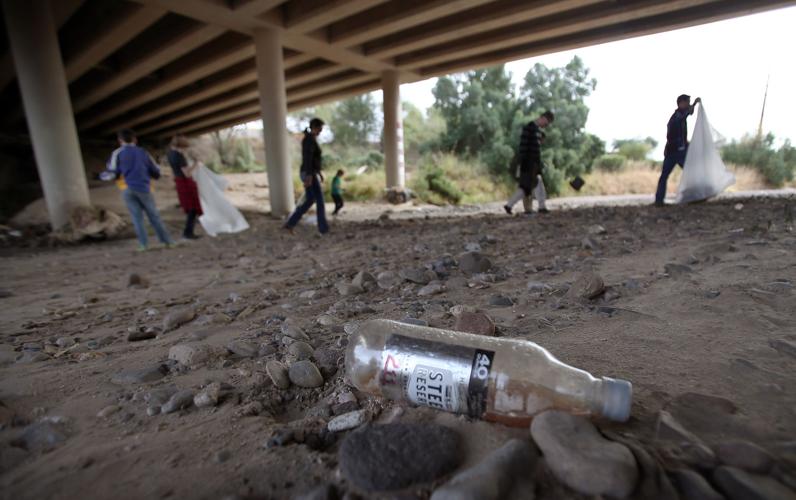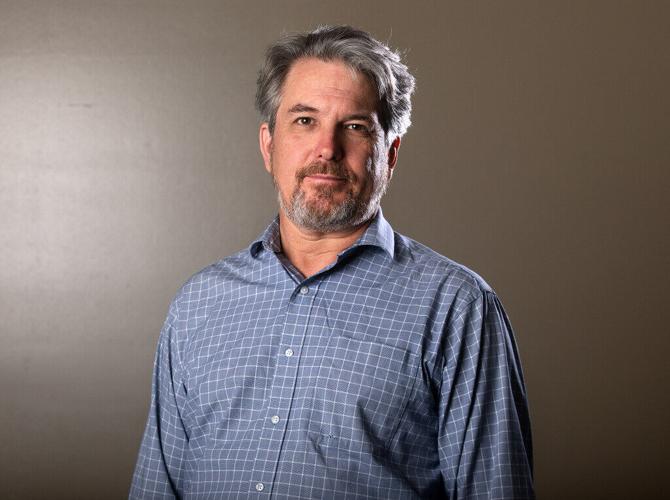Scraggly palo verde saplings, tall weeds, wrappers, shreds of tarps.
They line many of Tucson’s streets, clog its washes, fill its vacant lots. They help give Tucson its reputation as the “Dirty T.”
To clean that up, to make the Dirty T a cleaner T, we’re going to have to tax ourselves more. That’s the message the Tucson City Council and administration is preparing to send in the latest in a series of sales-tax elections. The council will decide Sept. 11 whether to move ahead with a sales-tax election in March that would raise the total sales tax in Tucson to 9.2% from 8.7%.
The sales tax would not, of course, just be for cleaning up the streets. It’s about that and many other basics of local governance that city officials say they can’t carry out adequately without $80 million or so more per year for 10 years, paid for by the people who buy stuff in Tucson.
City officials are calling it a “quality-of-life ballot measure,” and honestly that’s a pretty good description. Unlike previous sales-tax and bond elections, the proceeds of this one would not be narrowly focused but would go to a wide variety of efforts to pull Tucson up from its current state.
As the proposal stands — and it could change — most of the money would go to various public-safety needs, such as adding dozens more police officers and staffers, adding firefighters and firefighting equipment, and building a new police-fire station on the southeast side.
But millions would also go to a grab-bag of other purposes intended to bring Tucson up a notch. For example:
- $2 million a year for shade at bus stops and improved security and Wi-Fi on transit lines
- $2.5 million a year for the Housing First program for bringing people out of homelessness
- $1 million a year for early childhood programs
And $1.4 million would go to the Team Up to Clean Up program, which spiffs up our trashed areas. That’s a practice I’m familiar with, since I coordinate the six-times-a year cleanups of the wash in my neighborhood, one of many volunteer-run cleanup efforts in Tucson that take care of what the city can’t.
I asked City Manager Tim Thomure Friday if the city doesn’t have enough capacity to do the job of cleaning up Tucson.
“We don’t have enough capacity. We do have folks out there every day trying to keep up with the cleanliness and maintenance of Tucson and our public spaces,” he said. “Generally speaking, how Tucson looks and feels is not, I think the way most Tucsonans would like it to be at the moment.”
Haven’t we already paid?
That’s for sure. Tucson’s condition is suboptimal and not improving enough right now. But Tucsonans would be right to ask if we haven’t already ponied up to make that improvement happen.
We’ve passed a series of short-term bond issues and sales taxes in 2012, 2017, 2018 and 2022, that last one lasting 10 years. They passed with increasingly large margins, from just 953 votes in 2012 to 36,076 votes in 2022.
They were for, in order, street repairs, public safety equipment and stations, improvements to parks, and neighborhood street repairs along with pedestrian safety.
All that time, the city’s spending has been soaring, from $1.3 billion in fiscal year 2015 to $2.4 billion now. That’s a 89 % increase in total spending at the same time the city’s population grew by two to three percent.
When I mentioned that to Thomure, he said general-fund spending is a better measure than total spending, but still that’s gone up by 57 % in the last 10 years, to $749 million this year. In other words, the city is spending a lot more than ever, but is still asking for more, a half-cent per dollar spent more, to bring Tucson up a notch.
City officials blame the state in part, and the state isn’t blameless. We’re in the middle of a two-year, $40 million total decline in state-shared revenue due largely to the new flat-tax, which is bringing in less income tax.
But that decline is supposed to end, and state-shared revenue is projected to start increasing again in fiscal year 2026-2027. So this possible sales-tax election is way more than an effort to offset state cuts.
Thomure acknowledges this, as did the city council when they heard his proposal at Wednesday’s meeting.
“The spirit and intent of the plan is more toward the aspirational side,” he said.
And Council Member Paul Cunningham told me it’s necessary to address the effects of drug addiction in Tucson.
“A significant amount of the needs we have are in trying to manage and address the unsheltered and fentanyl crisis,” he said. “We want a measured response to get out in front of it and work the issue as well as we can.”
So, to take Tucson to the next level — to clean it up, make it safer, turn it more affordable and enriching — we need to pass a new half-cent sales tax.
Tucson voters receptive
The politics of this are pretty clear. Tucson voters have been increasingly receptive to city spending plans that we vote on. Beyond the four bonding and sales tax plans approved between 2012 and 2022, voters in the Tucson Unified School District also approved a $480 million bond plan last year.
And, most shockingly, city voters approved by 283 votes a big increase in the salaries paid to City Council members. So, the city is on a roll, the council knows this, and it seems like this could be a good time to keep rolling to address some of our obvious shortcomings.
It could be, unless city voters feel like their goodwill is being taken advantage of.
And the timing is complicated. At the same time the city may put this issue on the ballot in March, Tucson officials are also warming up to the latest proposal from the Regional Transportation Authority for the so-called RTA Next countywide transportation plan.
At the council meeting Wednesday, right after talking about this potential sales-tax vote, the members discussed a new version of the 20-year proposal for regional transportation needs. That plan would also mean a half-cent sales tax election, although in this case it would be an extension of an existing tax, not a new tax, and it would be voted on by all the county’s voters.
That could take place in May, two months after the city’s vote. It would be awkward timing that would test our recent willingness to tax ourselves in order to spend on ourselves. But the city would probably get the better of the twin votes, since its election would come first.
I don’t know how I’d vote on either plan as yet. While I have supported fare-free transit, it is costing us at least $10 million or so per year that we could collect in fares. Savings like that should probably be considered before we go for a new sales tax that disproportionately affects lower-income people.
It also strikes me that if this tax passes, and our total spending surges past $2.5 billion per year, we’ll probably be asked again before long to tax ourselves more for some other area of unmet need. After all, that’s the pattern the city is setting.





